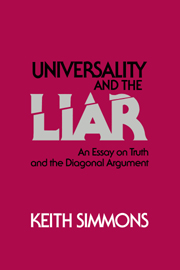Book contents
- Frontmatter
- Contents
- Preface
- Chapter 1 The Liar paradox
- Chapter 2 The diagonal argument
- Chapter 3 The diagonal argument and the Liar, I
- Chapter 4 The diagonal argument and the Liar, II
- Chapter 5 A medieval solution to the Liar
- Chapter 6 A singularity solution to the Liar
- Chapter 7 A formal account of singularities
- Chapter 8 Applications and further singularities
- Chapter 9 Semantic universality
- Notes
- Bibliography
- Index
Chapter 7 - A formal account of singularities
Published online by Cambridge University Press: 19 October 2009
- Frontmatter
- Contents
- Preface
- Chapter 1 The Liar paradox
- Chapter 2 The diagonal argument
- Chapter 3 The diagonal argument and the Liar, I
- Chapter 4 The diagonal argument and the Liar, II
- Chapter 5 A medieval solution to the Liar
- Chapter 6 A singularity solution to the Liar
- Chapter 7 A formal account of singularities
- Chapter 8 Applications and further singularities
- Chapter 9 Semantic universality
- Notes
- Bibliography
- Index
Summary
PRAGMATIC AND SEMANTIC ASPECTS
We may distinguish two components of the singularity proposal: a pragmatic component and a semantic component. The two main concerns of the pragmatic component have already emerged in the previous chapter. One is the identification of the contextual parameters that play a role in Strengthened Liar reasoning. The other is the articulation of the pragmatic principles of interpretation that guide our treatment of truth. The semantic component is the main topic of the present chapter. Our aim is to give a more precise characterization of semantic well-being, semantic pathology, and singularities. There is of course a good deal of interplay between the pragmatic and semantic aspects of the theory. For example, we will see how the pragmatic principles of Minimality and Symmetry guide the semantic account; and in the other direction, we will see how the semantic account provides for a precise formulation of Symmetry.
But it is important for present purposes to note that the characterization of explicit reflections (either partial or complete) is a matter for the pragmatic part of our account. In the previous chapter, we characterized explicit reflections in pragmatic terms, via contextual features – in particular, discourse position, relevant information, intentions, and implicatures. The tripartite division between partial explicit reflections, complete explicit reflections, and all other evaluations is a pragmatic division. This division does not uniquely determine the semantic account: It does not determine the definition of pathologicality or the extension of occurrences of ‘true’.
- Type
- Chapter
- Information
- Universality and the LiarAn Essay on Truth and the Diagonal Argument, pp. 118 - 141Publisher: Cambridge University PressPrint publication year: 1993



